John Janaro's Blog, page 172
October 29, 2018
Chiara, the Girl Full of Light
 Today, the Focolare Movement and the diocese of Acqui celebrate the memorial of Blessed Chiara Luce Badano, and all of us who love her may surely join them in prayer and in our hearts.
Today, the Focolare Movement and the diocese of Acqui celebrate the memorial of Blessed Chiara Luce Badano, and all of us who love her may surely join them in prayer and in our hearts.This Italian girl, who died after a long, agonizing struggle with bone cancer in 1990 (just short of her 19th birthday), allowed Jesus to give her a share in the suffering of His "cry of abandonment" from the cross. Thus He perfected in her a vast love that seeks out those who suffer, especially those who are furthest from Him and most in need of Him.
So great and enduring is this love that—six and a half years ago, and less than two years after her beatification—she even found me.
Thank you, dear Chiara Luce Badano for "tapping me on the shoulder" on that day (and on many days since then) and offering to be my friend. Thank you for praying for me, listening to me, helping me to see the goodness and share the suffering of others, introducing me to new friends in places I never would have expected to find them, and for the surprises: when you tap me on the shoulder and say, "Look, look, look! There! There is the light of Christ. There is the love greater than death!" Thank you.
Published on October 29, 2018 19:47
October 26, 2018
Twelve Years Later: The Josefina Story
 When I posted on social media about Josefina's 12th birthday, I realized that a dozen years is no small period of time.
When I posted on social media about Josefina's 12th birthday, I realized that a dozen years is no small period of time.I have made many new connections and acquired new readers since our youngest child was born. Many of them don't know the crazy story of the first year of this irrepressible kid's life. From the beginning, she was small in size but with a personality big enough to fill the room.
Josefina was "supposed to be born" in December, so when Eileen began having what seemed like the early stages of labor on the morning of October 26, 2006, we called the doctor. They didn't think anything unusual was happening. "Still," they said, "why don't you come in and we'll make sure...."
It's a good thing we went in that morning.
By the time Josefina was born a few hours later, the hospital had already detected her undeveloped intestinal tract, and we knew she would need major surgery (although it was hard to imagine what that could mean). In view of the emergency situation, I baptized her right away. The chaplain arrived some minutes later and administered Confirmation, which in the Latin rite of the Catholic Church is given to babies who are in danger of death.
Before long our tiny daughter was behind glass in an enormous, technologically decked out mobile incubatory contraption in order to be transported immediately to Fairfax Hospital for emergency surgery, where the neonatalogists amazingly connected her intestinal tract, using surgical techniques that were truly marvelous. She was then set up with an intravenous feeding tube and given her place in the "NICU" (Neonatal Intensive Care Unit). We were told that when the operation healed and she began digesting normally, we could bring her home. The original estimate was that it would take three weeks.
But Josefina kept having setbacks. Weeks turned into months. She wasn't healing properly. In March she needed another emergency surgery. There were some scary points as the time stretched on. There were infections and breathing complications. My mother-in-law came from California to take care of the house and kids while Eileen drove every day to Fairfax to be with Josefina.
My wife once again proved to be heroic.
I was still working full time as a teaching professor at the college. My health had been good for a while up until then. Indeed, I had had a lengthy remission, and was in great shape until the strain of all this started to wear me down again. I would go to Fairfax Hospital with Eileen as often as I could, and I took videos so that the other children could see their sister (older children were not allowed in the NICU).
 Josefina charmed everyone with her enormous eyes and dimply smile. She was adorable, but also fragile. The problems, and the length of time it was taking to resolve them, baffled even the doctors. After nearly seven months of the tension of living this way, everyone was exhausted and I was headed for another major relapse. The whole experience contributed to the subsequent ruin of my health (which I have written plenty about elsewhere). It was an extraordinarily difficult and uncertain time for all of us.
Josefina charmed everyone with her enormous eyes and dimply smile. She was adorable, but also fragile. The problems, and the length of time it was taking to resolve them, baffled even the doctors. After nearly seven months of the tension of living this way, everyone was exhausted and I was headed for another major relapse. The whole experience contributed to the subsequent ruin of my health (which I have written plenty about elsewhere). It was an extraordinarily difficult and uncertain time for all of us.But Josefina made it. She finally came home on May 16, 2007, still weighing only ten pounds. She started out with a nasal-gastric feeding tube, but soon she was on her own. She needed a special formula, had some digestive problems, and a moderate asthmatic condition for the next couple of years, but everything was fine after that.
By now, she has been eating a normal diet for most of her life. She is still on the small side, and looks younger than 12 years old. But she's in good health, and she has so much to give and is so very much loved by us all.
It was, indeed, a long time ago. Many things have changed since then. Many circumstances have been hard and some have seemed impossible, but the Lord has led us through them, or He has at least enabled us to endure them without losing confidence in Him.
I'm so grateful for Josefina. It has been a tremendous gift to have her and her three sisters and brother with us in our journey through life. Family life is our vocation. It has many joys and many challenges, but they constitute what God asks of us. They are the way that He is drawing us to Himself, according to His wisdom and love.
Really, we cannot control our lives in this world. Through affluence, humans tend to forget this. Of course, one makes prudent decisions and plans for the future as far as one is able to judge its probable course.
But we are not in control. Our possession of things is fragile. Really, we must hold on to God's plan, with prayer and hope, because He brings good out of everything.
Happy Birthday, Josefina. We love you!
Published on October 26, 2018 20:30
October 25, 2018
"My Front Porch" on a Sunny October Day
I have been trying to get outdoors, if nothing else for Vitamin D infusions (a.k.a. sunlight
Published on October 25, 2018 10:00
October 24, 2018
I Don't Like to Think About Lyme Disease
 September and October are always rough months. Now that it's been a couple of weeks of more-than-usual exhaustion and aches, I have to assume that I'm having some kind of flare-up of Whatever-the-Heck. This is something different (with a different pattern of symptoms) from the Major Depression and/or OCD that I have struggled with periodically since I was ten years old.
September and October are always rough months. Now that it's been a couple of weeks of more-than-usual exhaustion and aches, I have to assume that I'm having some kind of flare-up of Whatever-the-Heck. This is something different (with a different pattern of symptoms) from the Major Depression and/or OCD that I have struggled with periodically since I was ten years old.I would like to consider my long, tortuous battle with Lyme Disease as something "in the past." I don't like to talk about it or even think about it these days. I first recall having a series of the classic early Lyme symptoms (which don't always occur) in 1988, though I didn't know the meaning of them at the time, nor did my doctor. People in Virginia had hardly even heard about Lyme back then. The infection was unresolved and quite possibly boosted by subsequent tick bites in the years leading up to more widespread health deterioration and finally diagnosis in 2004 and subsequent treatment. 16 years is a very, very long time to go without any treatment. I would hope that something like this would never happen today.
Still, we did treat it intensively for a couple of years. We threw everything at it, conventional medicine, experimental stuff, dietary stuff, you name it. I saw all the doctors and did all the things and spent all the money over a decade ago. We beat Lyme Disease. Didn't we?
Well, kind of.... I have adjusted my lifestyle and continued with a basic protocol that has been helpful to me (in dealing with my own issues in the context of my own larger health needs). As a result, I'm managing this thing and keeping it in remission... mostly, kind of.
Periodically, "it" comes around with something of its old vigor and pokes me. It takes a few weeks to get things back to mostly-under-control, and then we go on. It's just as well that it's not more than this. I have enough other problems to deal with.
When I speak or write about my health, I usually emphasize my lifelong problems with mental illness, because they are (in some sense) deeper and more difficult for me, and because I have been able to articulate these experiences in ways that others can relate to; I have been something of a voice for others who can't speak for themselves. Mental health advocacy is very necessary, as is any encouragement I can give to people who are suffering. I'm not always up to it, but I do my best.
It's ironic. For me, at least, mental illness—with all its lingering stigma—is easier to talk about than Lyme Disease.
A lot of folks are spooked by Lyme. They have heard stories about people being crippled or even dying, about how awful a disease this is (and it can be, or become such, especially when it's long neglected). Some of my old students, colleagues, and friends remember seeing me in pretty bad shape. They were scared for me, and maybe sometimes a bit scared of me. A sick person is a reminder of how vulnerable we all are as human beings, and that's a scary thing.
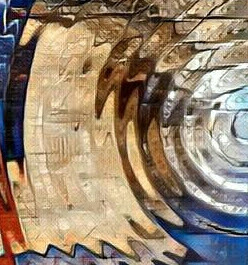 But then there are periods of time when a person with Lyme Disease "looks fine," and folks think, "Why are they always complaining about being sick?" Just because you don't see their sufferings, however, doesn't mean they aren't sick. And Lyme is shape-shifting, unpredictable, variable, chaotic, and so often invisible to others. No wonder it's hard to talk about. The whole business is so complicated.
But then there are periods of time when a person with Lyme Disease "looks fine," and folks think, "Why are they always complaining about being sick?" Just because you don't see their sufferings, however, doesn't mean they aren't sick. And Lyme is shape-shifting, unpredictable, variable, chaotic, and so often invisible to others. No wonder it's hard to talk about. The whole business is so complicated.It's also controversial in the world of medicine and healthcare. There are controversies about diagnostics and treatment and complimentary therapies. And Lyme doesn't help by being so elusive and perplexing.
I have some post-traumatic stress from the so-called "Lyme Wars," frankly. Many people have been earnestly examining the vast unknown realms of this freaky, tick-borne multi-pathogenic disease that is spreading all over the world and often doesn't "follow the rules" in terms of who gets it, how badly they get it, or how much they can be "cured" of it. The medical experts and health researchers have developed different theories, and they have often ended up fighting with one another like dogs fighting over a bone.
People suffering from Lyme end up being the bone. It's no fun being the bone. In fact, it can be quite traumatic. I have found all of this very hard to handle.
The general situation of things may be improving, however. There are continued advances in more sophisticated scientific research. Meanwhile, the disease continues to spread, and the more it impacts people, the more urgent and insistent becomes the call to move things forward. Not everyone who crosses paths with Lyme Disease has the kind of wider profile of psychiatric illness that I do. Quite the contrary. Lyme strikes physically, mentally, and emotionally healthy people all the time; it causes sudden and strange collapse and debilitating illness for people who are normally strong and full of energy.
These people generally can't be bullied into self doubt or put off by being told that it's "all in their heads." They can't be plausibly accused of trying to find excuses to shirk their responsibilities. They are not even looking for sympathy. They have been inexplicably knocked off their feet and pounded in their heads and many other places all over their bodies. They want to get better.
 I do still have the-part-of-my-brain-that-works and I had a good amount of physical energy before I got sick. After all, I didn't get Lyme Disease by sitting in the library. I got it hiking off trails through the woods in the Blue Ridge mountains and following deer paths along the river looking for good fishing spots in my beloved, beautiful, tick-infested Shenandoah Valley. So I can sympathize with how people accustomed to vigorous physical good health and a high-energy lifestyle feel about being pained, drained, and wiped out by this bizarre sucky disease.
I do still have the-part-of-my-brain-that-works and I had a good amount of physical energy before I got sick. After all, I didn't get Lyme Disease by sitting in the library. I got it hiking off trails through the woods in the Blue Ridge mountains and following deer paths along the river looking for good fishing spots in my beloved, beautiful, tick-infested Shenandoah Valley. So I can sympathize with how people accustomed to vigorous physical good health and a high-energy lifestyle feel about being pained, drained, and wiped out by this bizarre sucky disease.They are taking the lead in advocacy. They include parents of once healthy but now afflicted children, as well as successful adults in many fields who have gotten sick themselves or taken care of loved ones who are sick—athletes, business and professional people, entertainers, artists, musicians, including some internationally famous celebrities. I'm very grateful for these people.
I can do my small part, within limits that I have found can become an occasion to focus on a few worthwhile activities, and to discover new forms of constructive creativity. I have very little advice to offer (other than directing people to resources such as the Global Lyme Alliance). I want to support people, listen to their stories, empathize, and encourage them as best as I can.
For the present, I had better be sure to get the necessary rest, hoping that the present episode will be resolved according to the usual pattern for me. Of course, there has been nothing "usual" about this year of ongoing stress and sorrow. If things get worse or new problems develop, I'll have to face them. But I am determined to resist the temptation to be fatalistic and cynical.
I won't give up.
Published on October 24, 2018 09:00
October 23, 2018
The Gift of a New Life
Being Christian is not an 'identity' we construct by our own power; rather it is the gift of God in Jesus Christ—it is 'grace'; it is the gift of a new life in which the Spirit empowers us to love God truly, and to love one another.

"God, who is rich in mercy,
because of the great love he had for us,
even when we were dead in our transgressions,
brought us to life with Christ (by grace
you have been saved),
raised us up with him,
and seated us with him in the heavens in Christ Jesus,
that in the ages to come
he might show the immeasurable riches of his grace
in his kindness to us in Christ Jesus.
For by grace you have been saved through faith,
and this is not from you; it is the gift of God;
it is not from works, so no one may boast.
For we are his handiwork,created in Christ Jesus for good works
that God has prepared in advance,
that we should live in them"
(Ephesians 2:4-10).

"God, who is rich in mercy,
because of the great love he had for us,
even when we were dead in our transgressions,
brought us to life with Christ (by grace
you have been saved),
raised us up with him,
and seated us with him in the heavens in Christ Jesus,
that in the ages to come
he might show the immeasurable riches of his grace
in his kindness to us in Christ Jesus.
For by grace you have been saved through faith,
and this is not from you; it is the gift of God;
it is not from works, so no one may boast.
For we are his handiwork,created in Christ Jesus for good works
that God has prepared in advance,
that we should live in them"
(Ephesians 2:4-10).
Published on October 23, 2018 14:39
October 22, 2018
Forty Years Ago Today: "Do Not Be Afraid"
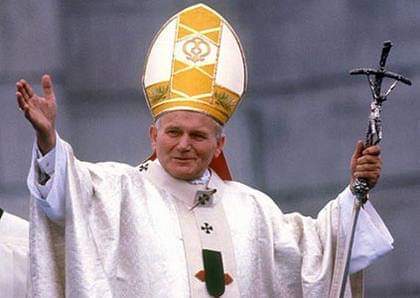
"The absolute, and yet sweet and gentle, power of the Lord responds to the whole depths of the human person, to his loftiest aspirations of intellect, will and heart. It does not speak the language of force, but expresses itself in charity and truth" (Saint John Paul II, October 22, 1978).
Published on October 22, 2018 11:44
October 21, 2018
The Message of Marshall McLuhan
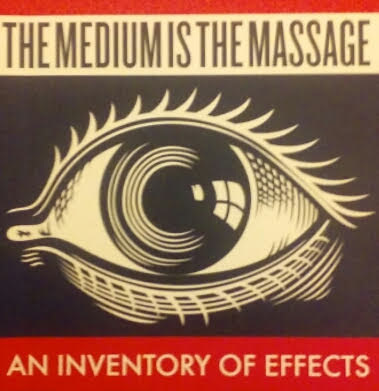 Often considered the founder of the academic discipline of "Media Studies," Marshall McLuhan coined many terms and phrases that have become common over the past half-century with the explosion in the development of communications technology.
Often considered the founder of the academic discipline of "Media Studies," Marshall McLuhan coined many terms and phrases that have become common over the past half-century with the explosion in the development of communications technology.He is often noted for declaring that "the medium is the message." This provocative and paradoxical statement was McLuhan's way of calling attention to the fact that the communication of a message, in reality, is not simply the pure transference from one mind to another of intelligible content; a message is conveyed through forms of mediation (media) that create an environment within which communication takes place.
On the left, we have reproduced a segment of the cover of McLuhan's 1967 book The Medium is the Massage. Wait..."massage" with two "a's?" I just said "message" before. But look closely at the title. Is it a mistake?
What appears to be a typo in the book's title was actually an ironic twist on the famous phrase, which McLuhan employed to refer to an increasing phenomenon of the 1960s, namely, the constant immersion of people in the media technology of television and advertising. These "non-linear," surrounding, "involving" presentations of rapid images and conceptual associations massage us (manipulate us?) consistently throughout the day. Our minds adopt "positions" or change them, through being "worked over" in ways we don't even notice.
That was in 1967. McLuhan died in 1980, but he predicted the broad outlines of the ongoing 21st Century communications revolution, including the development of portable and widely accessible interactive multimedia technology. Whatever gadget you are using to read this today, it would not have surprised him.
McLuhan's project was to understand how media work, and the impact on human experience of "new media" (his term, which he originally intended as a reference to what are now "old media" systems like television and computer data). He was primarily descriptive and exploratory in his methodology (as is suggested by the title of his groundbreaking 1964 book Understanding Media); but when his studies spilled over beyond academia into popular culture in the late 1960s, McLuhan himself became something of a "media celebrity," and was often taken as an advocate of that which he intended to describe.
In fact, he was anything but the ultra-hip utopian futurist prophet some might have wished him to be. McLuhan was a firmly grounded realist. He saw both the potential and the great dangers of new media technology, the gains and the inevitable losses and possible perils it entailed for the human experience. He was inclined, in fact, to be more pessimistic about what he saw emerging in "the global village" (another McLuhanism). He hoped that a thorough understanding would assist a more conscious, reflective, responsible, and balanced use of media—that it would lead to the cultivation of a media ecology (a project all the more necessary and urgent in our time).
Though it is not well known, McLuhan's methodology was grounded in a worldview much deeper than media studies, psychology, or even the academic disciplines of the sciences and humanities. While still young, he had entrusted his entire life to that super-exemplary, fundamental, definitive, mysterious and fully human mediator who is Jesus Christ crucified and risen, living in His Catholic Church.
Here is the story of how that came about:

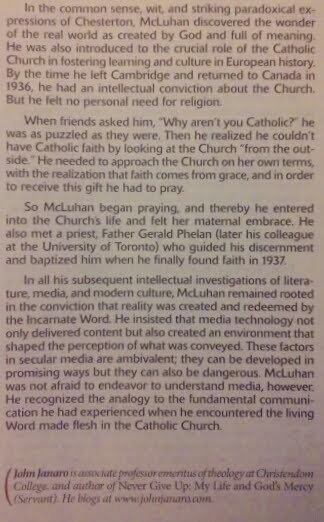
Published on October 21, 2018 18:34
October 19, 2018
Off into the Sunset?
Here's some digital art by me. It's a sunset.
 .
.
I might slow down on posting, or post less often, in the coming weeks.
.
I'm having a rough time.
 .
.I might slow down on posting, or post less often, in the coming weeks.
.
I'm having a rough time.
Published on October 19, 2018 20:30
October 15, 2018
Feels Like the Middle of October
For the record, here is the Janaro Estate, mid-October 2018. Last Friday was the first "sunny-and-not-roasting-hot" day of the season. (In fact it was a beautiful day.) No Fall foliage yet down in the Valley. The angle of the sun on the house at 3PM, however, is different from summertime, for sure.
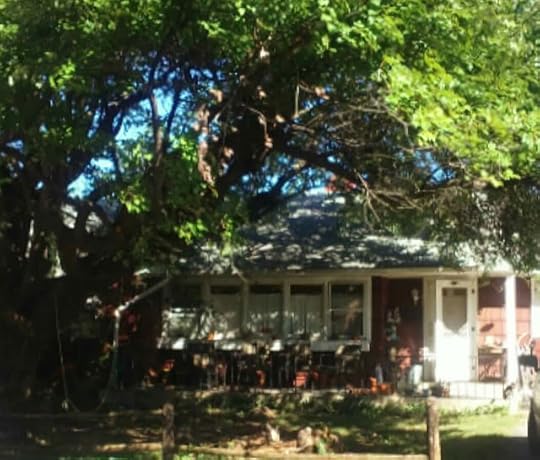
It_was looking kinda "Summery" over on the side of the house on Friday, with lots of sunshine but (finally!) cooler temperatures.

These maple leaves in the breeze look like they have no plans to "fall" anywhere. HOWEVER (see pic. 2)...

...a close inspection reveals that "the process" is beginning...

It_was looking kinda "Summery" over on the side of the house on Friday, with lots of sunshine but (finally!) cooler temperatures.

These maple leaves in the breeze look like they have no plans to "fall" anywhere. HOWEVER (see pic. 2)...

...a close inspection reveals that "the process" is beginning...
Published on October 15, 2018 20:00
October 14, 2018
The Courage of Saint Oscar Romero
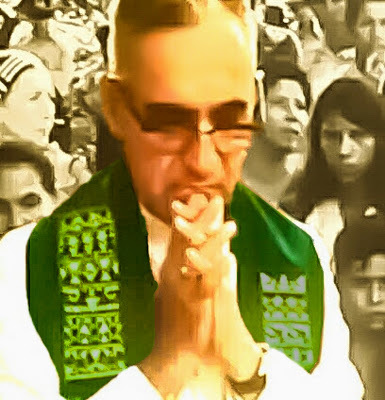 Lately, many of the entries on my blog have focused on specific people who I think are worth noting for a variety of reasons. These people are very different—not surprisingly there are saints and popes, but there are also scientists, rock stars, politicians, baseball players, and my own dear father.
Lately, many of the entries on my blog have focused on specific people who I think are worth noting for a variety of reasons. These people are very different—not surprisingly there are saints and popes, but there are also scientists, rock stars, politicians, baseball players, and my own dear father.They are different in many ways, but they have in common their humanity, their courage in different circumstances and on different levels, and in most cases their afflictions and/or deaths.
I am deeply moved by people who show courage in the endurance of affliction, people who do well—sometimes even to the point of heroism—that which is so awful and overwhelming to me, which I can only manage very badly.
I admire courageous people.
I admire the courage of newly canonized Saint Oscar Romero. The Archbishop of San Salvador was martyred in 1980 because of his persistent preaching of the gospel of Christ's justice and love against oppression of the poor by the criminal oligarchy in the long suffering nation of El Salvador.
Romero, however, challenges anyone who tries merely to admire him. He insists that we must be courageous, not from our own innate capabilities, but by being instruments of Jesus and letting His power work through us.
For me, a man who loves too much my own comfort (and just because sometimes I lack certain comforts doesn't mean I'm detached from them), Romero is a provocation. The more I study him, the more provoking he is. He is outside of everyone's boxes. He followed Christ intensely: being entrusted with authority in a situation almost unrivaled for social chaos, he followed the narrow path even though it meant being misunderstood by some and hated by others.
He followed Jesus Christ and was faithful to Him. He trusted in Him. He obeyed Christ and loved Christ in the Church. And for Oscar Romero, "Christ in the Church" was the Eucharist and the sacraments and the teaching and tradition and unity with the Bishop of Rome and the faces of the poor in El Salvador and the face of every human person.
He saw Christ with simplicity of heart. We are the ones who make it so complicated. Still he had much to say to those of us with divided hearts. Christ died for all of us, even for those of us who cripple ourselves by trying to serve both God and mammon.
We especially need Christ to liberate us from this illusion, to open our eyes to see that He is the Lord of history who is present in our lives and who leads us to our destiny in the glory of God. Romero's life and his martyrdom will help us to find this freedom.
Saint Oscar Romero of the Americas, pray for us!
What I have below is a collection of some Romero quotations that I have been meditating on recently. I may continue to add to it for my own reference. These are words that give some sense of his convictions about the relationship between real faith and real life, the fulfillment of this life in eternity, and the integral reality of the Church in the world. They indicate the way he lived and the way he died. His living and dying have much to teach us, now more than ever.
.

*********************************************************************************
Saint Oscar Romero, Quotations:
This is the meaning of Eucharist, the living presence and the life giving presence of Christ in person here in history. The primary and most important person who is present during the Mass is Christ on the altar. Therefore each time that we come to Mass it is he, Jesus Christ, whom we come to hear and follow and love.
When we leave Mass, we ought to go out the way Moses descended Mount Sinai: with his face shining, with his heart brave and strong to face the world's difficulties.
Wherever there is someone who has been baptized, that is where the Church is. There is a prophet there. Let us not hide the talent that God gave us on the day of our baptism and let us truly live the beauty and responsibility of being a prophetic people.
Let us not forget: we are a pilgrim Church, subject to misunderstanding, to persecution, but a Church that walks serene, because it bears the force of love.
The Eucharist...looks ahead to the future, to the eternal, eschatological, and definitive horizon that presents itself as a demanding ideal to all political systems, to all social struggles, to all those concerned for the earth. The Church does not ignore the earth, but in the Eucharist she says to all who work on earth: 'Look beyond!' Each time the Victim is lifted up at Mass, Christ’s call is heard: 'Until we drink it anew in my Father’s kingdom.' And the people reply: 'Come, Lord Jesus!' There is a hope. They are a people that march to encounter the Lord. Death is not the end. Death is the opening of eternity’s portal. That is why I say: all the blood, all the dead, all the mysteries of iniquity and sin, all the tortures, all those dungeons of our security forces where unfortunately many persons slowly die— all of this does not mean that they are lost forever. There is an eschatological horizon that illuminates all this darkness and that enables truth and justice and victory to sing. This eschatological horizon will be the definitive triumph of all those who struggle for justice and love.
*********************************************************************************
The Eucharist nourishes all of the just claims of the earth because it provides a true horizon. When individuals or groups want to work only for the earth and have no horizon of eternity and do not care about religious horizons, they are not true liberators. You cannot trust them. Today they struggle for power, and once in power, tomorrow they will be the worst repressors if they have no horizon that goes beyond history to sanction the good and the bad that we do on earth. That way there can be no true justice or effective work on behalf of the just demands of people.
When we speak for the poor, please note that we do not take sides with one social class. What we do is invite all social classes, rich and poor, without distinction, saying to everyone let us take seriously the cause of the poor as though it were our own.
Each time we look upon the poor, on the farmworkers who harvest the coffee, the sugarcane, or the cotton... remember, there is the face of Christ.
There is no dichotomy between man and God's image. Whoever tortures a human being, whoever abuses a human being, whoever outrages a human being, abuses God's image.
We suffer with those who have disappeared, those who have had to flee their homes, and those who have been tortured.
*********************************************************************************
A preaching that does not point out sin is not the preaching of the gospel. A preaching that makes sinners feel good, so that they are secured in their sinful state, betrays the gospel's call.
A Church that doesn't provoke any crises, a gospel that doesn't unsettle, a word of God that doesn't get under anyone's skin, a word of God that doesn't touch the real sin of the society in which it is being proclaimed — what gospel is that?
With Christ's light let us illuminate even the most hideous caverns of the human person: torture, jail, plunder, want, chronic illness. The oppressed must be saved, not with a revolutionary salvation, in mere human fashion, but with the holy revolution of the Son of Man, who dies on the cross to cleanse God's image, which is soiled in today's humanity, a humanity so enslaved, so selfish, so sinful.
When the Church hears the cry of the oppressed it cannot but denounce the social structures that give rise to and perpetuate the misery from which the cry arises.
How easy it is to denounce structural injustice, institutionalized violence, social sin! And it is true, this sin is everywhere, but where are the roots of this social sin? In the heart of every human being. Present-day society is a sort of anonymous world in which no one is willing to admit guilt, and everyone is responsible. We are all sinners, and we have all contributed to this massive crime and violence in our country. Salvation begins with the human person, with human dignity, with saving every person from sin.
It moves one's heart to think: Nine months before I was born there was a woman who loved me deeply. She did not know what I was going to be like, but she loved me because she carried me in her womb. And when she gave me birth, she took me in her arms, because her love was not just beginning - she conceived it along with me. A mother loves - and that is why abortion is so abhorrent.
I don’t want to be an 'anti,' against anybody. I simply want to be the builder of a great affirmation: the affirmation of God, who loves us and who wants to save us.
Authority in the Church is not command, but service...To my shame, as a pastor, I beg forgiveness from you, my community, that I have not been able to carry out, as your servant, my role as bishop. I am not a master, I am not a boss, I am not an authority that imposes itself. I want to be God’s servant, and yours.
I am bound, as a pastor, by divine command to give my life for those whom I love, and that is all Salvadoreans, even those who are going to kill me.
*********************************************************************************
Let us not develop an education that creates in the mind of the student a hope of becoming rich and having the power to dominate. Let us form in the heart of a child and young person the idea of loving, of preparing oneself to serve and giving oneself to others.
*********************************************************************************
We are no more than an instrument of God; we live only as long as God wants us to live; we can only do as much as God makes us able to do; we are only as intelligent as God would have us be.
If we are worth anything, it is not because we have more money or more talent, or more human qualities. Insofar as we are worth anything, it is because we are grafted on to Christ’s life, his cross and resurrection. That is a person’s measure.
Published on October 14, 2018 20:36



